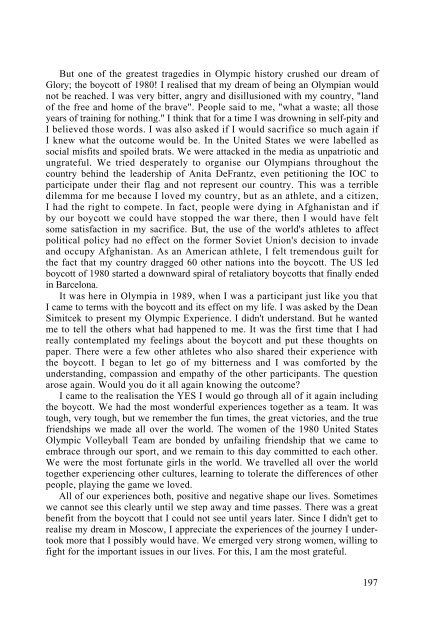download - IOA
download - IOA
download - IOA
You also want an ePaper? Increase the reach of your titles
YUMPU automatically turns print PDFs into web optimized ePapers that Google loves.
But one of the greatest tragedies in Olympic history crushed our dream of<br />
Glory; the boycott of 1980! I realised that my dream of being an Olympian would<br />
not be reached. I was very bitter, angry and disillusioned with my country, "land<br />
of the free and home of the brave". People said to me, "what a waste; all those<br />
years of training for nothing." I think that for a time I was drowning in self-pity and<br />
I believed those words. I was also asked if I would sacrifice so much again if<br />
I knew what the outcome would be. In the United States we were labelled as<br />
social misfits and spoiled brats. We were attacked in the media as unpatriotic and<br />
ungrateful. We tried desperately to organise our Olympians throughout the<br />
country behind the leadership of Anita DeFrantz, even petitioning the IOC to<br />
participate under their flag and not represent our country. This was a terrible<br />
dilemma for me because I loved my country, but as an athlete, and a citizen,<br />
I had the right to compete. In fact, people were dying in Afghanistan and if<br />
by our boycott we could have stopped the war there, then I would have felt<br />
some satisfaction in my sacrifice. But, the use of the world's athletes to affect<br />
political policy had no effect on the former Soviet Union's decision to invade<br />
and occupy Afghanistan. As an American athlete, I felt tremendous guilt for<br />
the fact that my country dragged 60 other nations into the boycott. The US led<br />
boycott of 1980 started a downward spiral of retaliatory boycotts that finally ended<br />
in Barcelona.<br />
It was here in Olympia in 1989, when I was a participant just like you that<br />
I came to terms with the boycott and its effect on my life. I was asked by the Dean<br />
Simitcek to present my Olympic Experience. I didn't understand. But he wanted<br />
me to tell the others what had happened to me. It was the first time that I had<br />
really contemplated my feelings about the boycott and put these thoughts on<br />
paper. There were a few other athletes who also shared their experience with<br />
the boycott. I began to let go of my bitterness and I was comforted by the<br />
understanding, compassion and empathy of the other participants. The question<br />
arose again. Would you do it all again knowing the outcome?<br />
I came to the realisation the YES I would go through all of it again including<br />
the boycott. We had the most wonderful experiences together as a team. It was<br />
tough, very tough, but we remember the fun times, the great victories, and the true<br />
friendships we made all over the world. The women of the 1980 United States<br />
Olympic Volleyball Team are bonded by unfailing friendship that we came to<br />
embrace through our sport, and we remain to this day committed to each other.<br />
We were the most fortunate girls in the world. We travelled all over the world<br />
together experiencing other cultures, learning to tolerate the differences of other<br />
people, playing the game we loved.<br />
All of our experiences both, positive and negative shape our lives. Sometimes<br />
we cannot see this clearly until we step away and time passes. There was a great<br />
benefit from the boycott that I could not see until years later. Since I didn't get to<br />
realise my dream in Moscow, I appreciate the experiences of the journey I undertook<br />
more that I possibly would have. We emerged very strong women, willing to<br />
fight for the important issues in our lives. For this, I am the most grateful.<br />
197
















